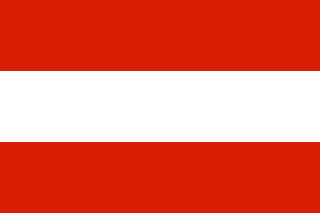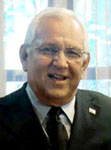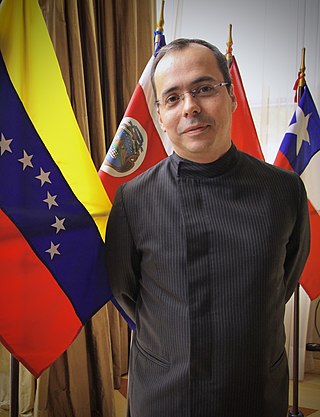| |||||
| Decades: | |||||
|---|---|---|---|---|---|
| See also: | |||||
List of events in the year 2011 in Honduras .
| |||||
| Decades: | |||||
|---|---|---|---|---|---|
| See also: | |||||
List of events in the year 2011 in Honduras .

Politics of Honduras takes place in a framework of a multi-party system presidential representative democratic republic. The President of Honduras is both head of state and head of government. Executive power is exercised by the government. Legislative power is vested in the National Congress of Honduras. The party system is dominated by the conservative National Party of Honduras, the Liberal Party of Honduras, and Liberty and Refoundation.

Toncontín Airport formerly Toncontín International Airport, also known as Teniente Coronel Hernán Acosta Mejía Airport is a civil and military airport located 6 km (4 mi) from the centre of Tegucigalpa, Honduras.

The Liberal Party of Honduras is a centrist liberal political party in Honduras that was founded in 1891. It is the oldest extant political party in the country; further, it is one of the two main parties that have, until recently, dominated Honduran politics. The party is a member of the Liberal International. The PLH is identified with the colours red and white, as the flag Francisco Morazán used in most of his military campaigns during time of the Central American Federal Republic.

Porfirio Lobo Sosa also known by his nickname, Pepe Lobo, is a former Honduran politician and agricultural landowner who served as President of Honduras from 2010 to 2014. A member of the conservative National Party and a former deputy in the National Congress of Honduras from 1990, he was president of the National Congress of Honduras from 2002 to 2006. He came second to Manuel Zelaya with 46% of the vote in the 2005 general election. After the military ousted Zelaya in a coup d'état, Lobo was elected president in the 2009 presidential election and took office on 27 January 2010.

José Manuel Zelaya Rosales is a Honduran politician who was President of Honduras from 27 January 2006 until his forcible removal in the 2009 coup d'état, and who since January 2022 serves as the first First Gentleman of Honduras. He is the eldest son of a wealthy businessman, and inherited his father's nickname "Mel". Before entering politics he was involved in his family's logging and timber businesses.

Elvin Ernesto Santos Ordóñez is a Honduran politician who served as the vice president of Honduras from January 2006 to November 2008, when he resigned to stand as a Liberal Party candidate for the presidency in the 2009 elections. For the 2005 election the constitution was amended to create a single vice president. Although Santos served as vice president under the presidency of Manuel Zelaya, he distanced himself from Zelaya since there were conflicts between the two politicians. He was also against the fourth ballot box referendum that Zelaya promoted.

General elections were held in Honduras to elect the President of Honduras, vice-president, and deputies to the National Congress of Honduras on 27 November 2005. For the 2005 election the constitution was amended to create a single vice-president. For the 2005 election the system of proportional representation was also changed from a closed list to an open list — the parties also used open-list primaries to select candidate slates. The list system reduced the re-election rate of incumbents, with just 31% of deputies in the new Congress having seats in the 2002–2006 Congress.

Roberto Micheletti Baín is a Honduran politician who served as the interim president of Honduras from 28 June 2009 to 27 January 2010 as a result of the 2009 Honduran coup d'état. The Honduran military ousted the President, and the National Congress read a letter of resignation, which was refuted two minutes later by Manuel Zelaya in conversation with CNN en Español; days later, the coup-plotters claimed that the Supreme Court had ordered to forcefully detain President Manuel Zelaya because "he was violating the Honduran constitution"; Zelaya was exiled rather than arrested. Micheletti, constitutionally next in line for the presidency, was sworn in as president by the National Congress a few hours after Zelaya was sent into exile by the Honduran military. He was not acknowledged as de jure president by any government or international organization. The 2009 general election took place as planned in November and elected Porfirio Lobo Sosa to succeed Micheletti.

General elections were held in Honduras on 29 November 2009, including presidential, parliamentary and local elections. Voters went to the polls to elect:

The 2009 Honduran constitutional crisis was a political dispute over plans to either rewrite the Constitution of Honduras or write a new one.
International reaction to the 2009 Honduran coup d'état of June 28, 2009, was that the coup was widely repudiated around the globe. The United Nations, every other country in the Western Hemisphere and others, publicly condemned the military-led 2009 Honduran coup d'état and ouster of Honduran President Manuel Zelaya as illegal and most labelled it a coup d'état. The Obama administration, along with all other governments in the hemisphere, branded the action a "coup." Every country in the region, except the United States, withdrew their ambassadors from Honduras. All ambassadors of the European Union were recalled. Venezuela said it would suspend oil shipments, and Honduras's neighbors — El Salvador, Guatemala and Nicaragua - stopped overland trade for 48 hours. The World Bank and Inter-American Development Bank suspended lending to Honduras.
The 2009 Honduran constitutional crisis was a political confrontation concerning the events that led to, included, and followed the 2009 Honduran coup d'état and the political breakdown associated with it. The coup was repudiated around the globe, but Roberto Micheletti, head of the government installed after the coup, has claimed that the Honduran Supreme Court ordered the detention of Manuel Zelaya, deposed President of Honduras, and that the following succession was constitutionally valid.

The 2009 Honduran coup d'état, which took place during the 2009 Honduran constitutional crisis, occurred when the Honduran Army, following orders from the Honduran Supreme Court, ousted President Manuel Zelaya on 28 June 2009 and sent him into exile. Zelaya had attempted to schedule a non-binding poll to hold a referendum on convening a constituent assembly for writing a new constitution. Despite court orders to cease, Zelaya refused to comply, and the Honduran Supreme Court issued a secret arrest warrant dated 26 June. Two days later, Honduran soldiers stormed the president's house in the middle of the night, detained him, and thwarted the poll. Instead of putting him on trial, the army put him on a military plane and flew him to Costa Rica. Later that day, after reading a resignation letter of disputed authenticity, the Honduran Congress voted to remove Zelaya from office and appointed Head of Congress Roberto Micheletti, his constitutional successor, to complete his term. This was the first coup to occur in the country since 1978.

Serious issues involving human rights in Honduras through the end of 2013 include unlawful and arbitrary killings by police and others, corruption and institutional weakness of the justice system, and harsh and at times life-threatening prison conditions.
The National Popular Resistance Front or National People's Resistance Front, frequently referred to as the National Resistance Front, is a wide coalition of Honduran grassroots organisations and political parties and movements that aims to restore elected President Manuel Zelaya and hold a constituent assembly to draw up a new constitution.
Public opinion on the 2009 Honduran coup d'état is divided in Honduras. There are three known opinion polls on the 2009 Honduran constitutional crisis. The polls show polarized Honduras. The first CID-Gallup showed support for President Manuel Zelaya's removal from office because of his actions but not the manner in which it was carried out. Subsequent opinion polls showed higher levels of opposition to the events of the coup, though the opinion of the government it inaugurated was more evenly mixed. According to the latest poll in October, only 48% of Hondurans regard Roberto Micheletti's performance as good or excellent, and 50% as bad or poor. Porfirio Lobo Sosa, an opposition member, led polls before the November elections and subsequently won the elections.

Juan José Rendón Delgado, known professionally as J. J. Rendón, is a Venezuelan political consultant, psychologist, and political activist, known for being the one who has directed and won the most electoral campaigns. He specializes in crisis resolution and is a human rights activist. He is a political asylee in the United States.

The Presidential Palace of Honduras is the official residence of the president of the Republic of Honduras. Currently the president resides in the Palacio José Cecilio del Valle.

Hilda Rosario Hernández Alvarado was an agronomy engineer and Honduran politician. She held posts in the nationalist governments of Ricardo Maduro, Porfirio Lobo Sosa, and of her brother, Juan Orlando Hernández, who served as Honduran president between 2014 and 2022. From January 2017 until her questionable death, she was a political advisor to her brother in his campaign for re-election in the Honduran general election of 2017.